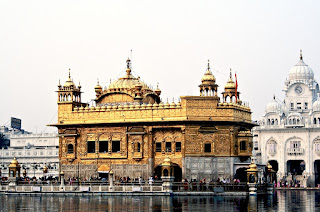It is amazing how a city can surprise you when you do not expect much from it. On an otherwise regular journey that comprised of Agra, Varanasi and Dharamsala, we expected to be awed every time we went somewhere. The Taj was expected to be the Taj. Varanasi was expected to be excellent for photo-ops and Dharamsala was expected to be what it was. However, on this journey of comparative religion, we had quite a surprise waiting for us.
 |
| The evening Arti in Varanasi. Image Courtesy: Ann Raets |
I have never been a great fan of religion. I was never quite keen or quite against it. To each his own. And to me, religion was more of a subject than something that I could actually follow. Moreover, in a country with 6 major religions and a million minor traditions, you would have to forgive my skepticism towards elaborate rituals that are more a show of wealth than a show of faith. Faith itself is hidden somewhere deep inside.
In this aspect, Varanasi itself is quite interesting. Although quite cliched, I have found Varanasi to be quite a fascinating collage every time I have visited the old city. Moreover, taking the boat down the ganges, I see Hinduism for what it really is – a way of life. The fact that it is meant to be this way makes me both proud and ashamed – proud of the fact that such a concept exists, and ashamed of the fact that those in power had twisted it to its current avatar just to suit their profits. Apart from this, it is amazing to see how life revolves and bows down to a river. Maybe Varanasi is one of the few cities to pay homage to something that is so essential. Most great cities are built around a river or a major water source. But most cities have quite forgotten where their water comes from or used to come from. Varanasi is one of the few cities that acknowledges and prays to this fact – and does nothing about it.
From Varanasi we had moved on to Agra and then Amritsar. We had not really expected much from Amritsar. Apart from the symbol or Sikhism, it is not supposed to have much. It does have a symbol of the freedom struggle. But the freedom struggle was in the last century. We have almost forgotten and taken our freedom for granted. Like most places of worship, I had already forecasted what I would see.
Or so I thought. For the Golden Temple is a different world on its own. Gone is the feeling that there are wars going on in some parts of the world. Gone is the memory of the petty squables that we had considered insulting. Gone is the rage that we felt during traffic hours. Gone is the greed we felt when we asked for the salary hike. This was something else altogether – and if I may say so, the closest definition to the divine.
 |
| The Golden Temple, Amritsar |
The first thing that strikes you is the absence of elaborate shows of faith. Apart from the basic courtesies, everyone prays in the way he or she would like. Some take a dip in the holy water. Some stand in queue to see the holy book. Others just note down the teaching of the day. All that you see are men laughing, women helping the children, people praying in silence and occasionally, the priests reciting verses from the book. The elements of faith to be followed are of one's personal concern and do not need to be shown to others. The people did not jostle for one more minute at the shrines. They did not get any special treatment on account of their wealth. They did not believe in such things. Instead, they went about doing whatever the eye-in-the-sky meant them to do. In a large dining room serving 50000 people a day, you could see people from all walks of life serving and eating. Physically old and mentally young, newlyweds and old couples, the rich and the poor, everyone did his bit to serve food to the other person. Everyone sat on the ground and next to each other. Anyone peeled the vegetables. Anyone cooked the dal or boiled the rice. Anyone made the tea. It was as if “class” had suddenly lost all meaning or reason for existence.
While we were leaving for Dharamsala, my friend told me that it is an amazing feeling to sit there with your eyes closed for 10 minutes and listen to everything around you. He said that he had felt quite at peace after that. Unfortunately, I missed out on that. But it was already quite baffling. The fact that there could be such a utopian practice did not baffle me as much as the fact that such a utopian practice was so simple. Gold itself, seemed to be so crystal clear and simple.
No comments:
Post a Comment